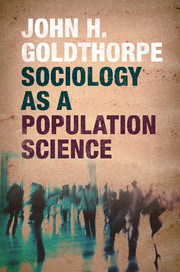Book contents
- Frontmatter
- Dedication
- Contents
- Acknowledgements
- Introduction
- 1 Sociology as a population science: the central idea
- 2 Individual variability in human social life
- 3 The individualistic paradigm
- 4 Population regularities as basic explananda
- 5 Statistics, concepts and the objects of sociological study
- 6 Statistics and methods of data collection
- 7 Statistics and methods of data analysis
- 8 The limits of statistics: causal explanation
- 9 Causal explanation through social mechanisms
- Conclusion
- References
- Index
7 - Statistics and methods of data analysis
Published online by Cambridge University Press: 05 December 2015
- Frontmatter
- Dedication
- Contents
- Acknowledgements
- Introduction
- 1 Sociology as a population science: the central idea
- 2 Individual variability in human social life
- 3 The individualistic paradigm
- 4 Population regularities as basic explananda
- 5 Statistics, concepts and the objects of sociological study
- 6 Statistics and methods of data collection
- 7 Statistics and methods of data analysis
- 8 The limits of statistics: causal explanation
- 9 Causal explanation through social mechanisms
- Conclusion
- References
- Index
Summary
In sociology as a population science the foundational role played by statistics in establishing population regularities stems, in the second place, from the need for methods of data analysis that are able to demonstrate the presence and the form of the population regularities that are emergent from the variability of human social life.
In this chapter, I move on from the role played by statistics in informing methods of data collection in sociology as a population science – that is, through sample survey research – to the role statistics plays in informing data analysis – that is, through what has become known as ‘multivariate analysis’. In fact, close links exist in the social sciences between sample survey research and multivariate data analysis; they have to a large extent evolved together.
In order to use surveys to capture the degree of variability in human social life or, in other words, population heterogeneity, the nature of this heterogeneity, or of such part of it as is of research interest, must be specified: that is to say, variables must be envisaged. This entails, to revert to the discussion of Chapter 5, the formation of appropriate concepts and then the development of classifications or scales through which these concepts can be made operational as variables with an adequate degree of reliability and validity. In turn, data from survey research expressed in variable form become the material to which methods of multivariate analysis can be applied in order to bring out – to make visible – the perhaps quite complex relations existing among variables. And it is through the statistical modelling of social data in this way that, in the manner suggested by Stigler, the objects of study of sociology are formed: the population regularities emergent from individual variability that constitute appropriate sociological explananda.
The term ‘variable sociology’ has often been used pejoratively in attacks on quantitative sociology, whether from ‘anti-positivist’ or other positions. It is, however, important to note that two quite different lines of criticism arise, although they are not infrequently confounded.
One objection (see e.g. Abbott, 1992; Esser, 1996; Sørensen, 1998) is concerned with the way in which, in sociological analysis conducted in terms of relations among variables, the action and interaction of individuals that underlie these relations can be, and often are, lost from sight.
- Type
- Chapter
- Information
- Sociology as a Population Science , pp. 85 - 98Publisher: Cambridge University PressPrint publication year: 2015



